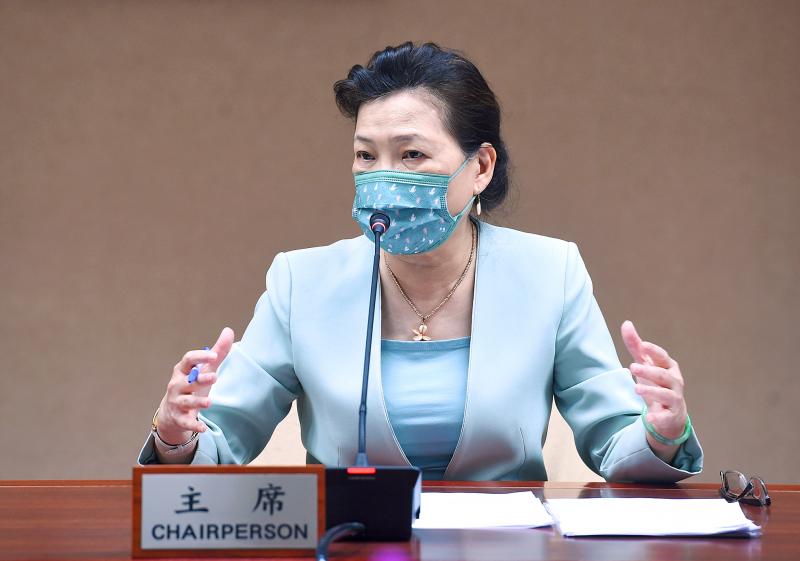China’s surprise application to join the Comprehensive and Progressive Agreement for Trans-Pacific Partnership (CPTPP) would not force Taipei’s hand in its own application, Minister of Economic Affairs Wang Mei-hua (王美花) said yesterday.
Speaking to reporters outside the Legislative Yuan in Taipei, Wang said that Taiwan has been pursuing back-channel negotiations with friendly countries to lobby for its inclusion in the CPTPP and other bodies.
“Our strategy is to line up allies in a low-key manner and work on building consensus before pursuing any official application,” Wang said. “That way, things tend to happen smoothly as a matter of course.”

Photo: Liu Hsin-de, Taipei Times
China, on the other hand, surprised the world when it moved to officially join the trade pact of 11 Pacific Rim countries, including Australia, Canada, Chile, Japan and New Zealand, she said.
Beijing’s surprise bid for inclusion does not mean Taipei should feel pressured into making a parallel bid, she added.
“There’s no set timetable for inclusion after an official bid,” Wang said. “There are certain procedures, and there has to be consensus from member countries that inclusion is appropriate.”
Wang said China’s moves to crack down on economic activities and unfriendly trade relations with CPTPP member nations could hurt its chances of inclusion.
“We could question if China meets the CPTPP’s high standards for inclusion right now,” Wang said. “Recently, China has repeatedly interfered with the economy in highly illiberal ways, heightened surveillance, reduced transparency and even banned imports without proper cause.”
Taiwan has been working on market liberalization and legal framework adjustments to be “CPTPP compatible,” Wang said.
The CPTPP is the successor to the Trans-Pacific Partnership, from which former US president Donald Trump withdrew during his tenure. The withdrawal of Taiwan’s most powerful supporter from the regional agreement has been seen as detrimental to Taiwan’s chances.
“Of course US support is always welcome in helping Taiwan join international organizations,” Wang said. “However, US President Joe Biden might have a lot to deal with right now with the [COVID-19] pandemic, economic recovery and strengthening bonds between allies.”
The CPTPP might also have to make some changes on issues such as the environment and labor before the US becomes more amenable to inclusion, Wang added.

US President Donald Trump yesterday announced sweeping "reciprocal tariffs" on US trading partners, including a 32 percent tax on goods from Taiwan that is set to take effect on Wednesday. At a Rose Garden event, Trump declared a 10 percent baseline tax on imports from all countries, with the White House saying it would take effect on Saturday. Countries with larger trade surpluses with the US would face higher duties beginning on Wednesday, including Taiwan (32 percent), China (34 percent), Japan (24 percent), South Korea (25 percent), Vietnam (46 percent) and Thailand (36 percent). Canada and Mexico, the two largest US trading

AIR SUPPORT: The Ministry of National Defense thanked the US for the delivery, adding that it was an indicator of the White House’s commitment to the Taiwan Relations Act Deputy Minister of National Defense Po Horng-huei (柏鴻輝) and Representative to the US Alexander Yui on Friday attended a delivery ceremony for the first of Taiwan’s long-awaited 66 F-16C/D Block 70 jets at a Lockheed Martin Corp factory in Greenville, South Carolina. “We are so proud to be the global home of the F-16 and to support Taiwan’s air defense capabilities,” US Representative William Timmons wrote on X, alongside a photograph of Taiwanese and US officials at the event. The F-16C/D Block 70 jets Taiwan ordered have the same capabilities as aircraft that had been upgraded to F-16Vs. The batch of Lockheed Martin

GRIDLOCK: The National Fire Agency’s Special Search and Rescue team is on standby to travel to the countries to help out with the rescue effort A powerful earthquake rocked Myanmar and neighboring Thailand yesterday, killing at least three people in Bangkok and burying dozens when a high-rise building under construction collapsed. Footage shared on social media from Myanmar’s second-largest city showed widespread destruction, raising fears that many were trapped under the rubble or killed. The magnitude 7.7 earthquake, with an epicenter near Mandalay in Myanmar, struck at midday and was followed by a strong magnitude 6.4 aftershock. The extent of death, injury and destruction — especially in Myanmar, which is embroiled in a civil war and where information is tightly controlled at the best of times —

China's military today said it began joint army, navy and rocket force exercises around Taiwan to "serve as a stern warning and powerful deterrent against Taiwanese independence," calling President William Lai (賴清德) a "parasite." The exercises come after Lai called Beijing a "foreign hostile force" last month. More than 10 Chinese military ships approached close to Taiwan's 24 nautical mile (44.4km) contiguous zone this morning and Taiwan sent its own warships to respond, two senior Taiwanese officials said. Taiwan has not yet detected any live fire by the Chinese military so far, one of the officials said. The drills took place after US Secretary